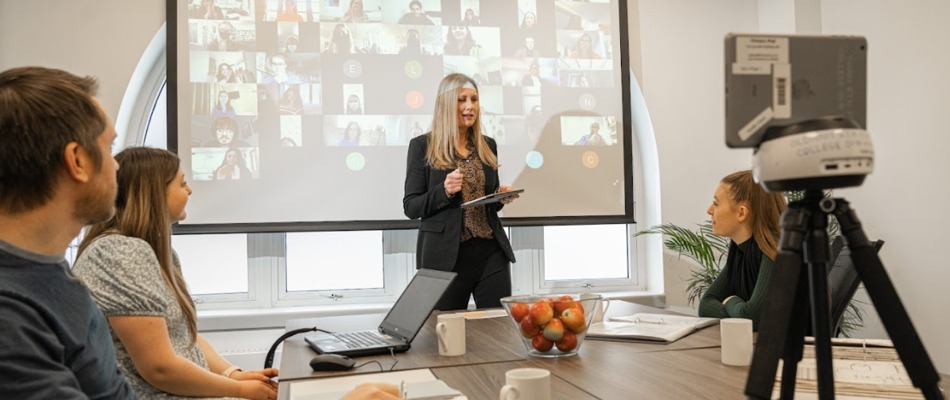Innovating by example
Back
The college’s journey with the use of EdTech innovation started in earnest in 2018, with whole-college CPD delivered by staff who were early adopters, who encouraged colleagues to embed G Suite applications into everyday teaching via a series of workshops and a dedicated Google Site for staff to access resources. This was a timely decision, allowing the college to be well positioned to operate effectively when the impact of the pandemic was felt in 2020. As a result of the relatively seamless transition to online learning in spring 2020, the college was selected by DfE to become an EdTech Demonstrator School, allowing other schools and colleges to benefit from our experiences and resources. Since then, the college has supported over 90 schools and colleges in their own EdTech journeys.
With the key fundamentals that underpin any lesson in mind, we designed and adapted our practice for remote teaching to match, as closely as possible, what a student would experience in any other year. We experimented with recording lessons but quickly realised that ‘live’ interactions with students were the key to maximising student engagement. Routines and high expectations were maintained by keeping students on the same timetable whilst working remotely, and using key features of Google Classroom, such as breakout rooms and Jamboards, encouraged peer collaboration and motivation. Assessment of learning and accountability was enhanced by setting assignments through Classroom, which could easily be monitored by staff remotely. This had a positive impact on progression for some of our vocational courses due to the fact that students were receiving feedback more efficiently and had greater opportunity to act on the feedback.
This success is particularly remarkable because the college provides for students in an area of high social deprivation, and was placed in ‘Tier 3’ from September 2020, culminating in students having a total of 10 ‘face to face’ weeks of teaching in the first eight months of the academic year. All traditional performance indicators, such as attendance, retention, progress data, and specification delivery were nonetheless in line with college averages for the past three years. Using Google Forms the College devised its own student satisfaction survey that had our highest ever return rate, with 94% of students stating that Google Classroom had helped them make progress. Equally, staff surveys specifically focused on how their understanding of G Suite applications allowed targeted support to be provided on a one to one basis or within teams in curriculum areas.
The schools and colleges supported through the EdTech Demonstrator Programme were also incredibly complimentary. One head said:
“This project took the staff from having very little knowledge to providing an excellent offer for remote learning fully using Google Classroom. Without this support, we would not have been ready to provide this standard of remote learning by January 2021. The staff were not quite ready by January 2021, but they had enough knowledge to get together and support each other, and by sharing knowledge and asking for support from OSFC, we continued to improve our offer throughout lockdown.”
A number of CPD themes based on the use of EdTech have now been incorporated into the projects which teachers will work on during this academic year, building on the experiences of 2020/21. These range from using technology to allow Y13 students to support Y12s to staff working towards the Google Certified Coach Programme, where some of our most experienced staff will support teachers who would like to enhance their teaching through the effective use of EdTech. Another key development area has been providing a more streamlined way of communicating with students through the use of Google Sites. Over 150 course Sites have been set up to allow students to access the best resources from each of the qualifications they have chosen at times which suit them. Students can access the resources through the Google Sites app, allowing students to push forward with their learning, consolidate, and prepare for key assessments, with the goal of students self-regulating how and when they study.
Our EdTech Demonstrator school status has been extended for a further 12 months. We are offering a free course to schools and colleges to take the best of what we have learnt over the last 12 months to accelerate teachers’ skills and abilities to use digital tools appropriately, with access to evidence-informed ‘best bets’. Beyond immediate concerns relating to possible ongoing disruptions to onsite learning, we look to exploit these new skills and technologies to develop blended learning as a key pedagogical tool for future teaching, learning and assessment. The course begins with a session for Senior Leaders responsible for the implementation of digital learning, and then trains in-school ‘champions’ to implement training back in their respective schools to ensure sustainability.
Practical tips:
- Focus on one key aspect of T&L and provide staff the time to 'plan, do and review'
- Use the most robust and up to date evidence informed practice to support CPD (EEF, Great Teaching Evidence Review)
- Keep it simple: focus on one platform and the key functions of that platform.
- Minimise disruption to routines where possible and maintain high expectations.
- Ensure accountability by making sure all tasks/assignments are monitored and/or assessed.
- Prioritise ‘ed’ before ‘tech’, using research evidence to inform pedagogy.
Chris Arnold is Assistant Principal at Oldham Sixth Form College. Earlier this year, the college won the SFCA Curriculum Innovation Award for its work. This is the latest in a series of blogs from the award winners explaining how they achieved their success.

